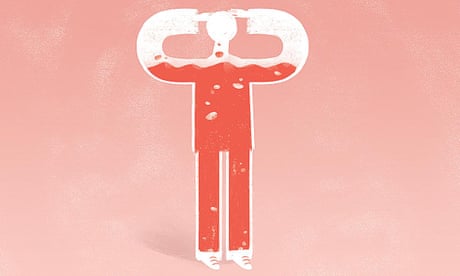
Flash point: as a society, we seem not to express anger and move on, but to stew in it – until, at the extremes, it hardens into violence and hate. Photograph: crossbrain66/Getty Images
by Oliver Burkeman
Main image: Flash point: as a society, we seem not to express anger and move on, but to stew in it – until, at the extremes, it hardens into violence and hate. Photograph: crossbrain66/Getty Images
Sat 11 May 2019 05.00 EDT Last modified on Sat 11 May 2019 05.56 EDT
It’s a standard observation that the world is getting angrier – but the truth is that taking the emotional temperature of an entire era is a mug’s game. For one thing, it’s almost impossible to get the necessary historical perspective: road rage, for example, feels like a modern phenomenon, until you learn that in 1817, Lord Byron was reported to the police for delivering a “swinging box on the ear” to “a fellow in a carriage, who was impudent to my horse”. It’s also easy to overlook the ways you’ve changed as an individual: I certainly remember life in the early 80s as less frustrating, but that’s surely just because I lived a child’s life of leisure, all expenses paid.
Still, the best data we have suggests that, overall, we are indeed getting angrier. Last year, 22% of respondents around the world told the Gallup organisation they felt angry, a record since the question was first asked in 2006. And something else, even harder to measure, feels like it’s different as well: it’s as though our anger has curdled, gone rancid. As a society, we seem not to express it and move on, but to stew in it – until, at the extremes, it hardens into violence and hate.
Because the effects of anger are sometimes so appalling, it’s easy to conclude that anger is inherently bad in itself – with occasional exceptions, perhaps, for major social transformations, like the fight for women’s suffrage, or the US civil rights movement. But studies have consistently shown that even everyday anger – not campaigns against injustice, but snappy remarks over the dinner table – usually has positive results. Pioneering work in the 1970s by the American researcher James Averill, confirmed in the years since, found that nonviolent expressions of anger generally helped people understand each other better, and to cooperate more successfully. “When an angry teenager shouted about his curfew, his parents agreed to modifications – as long as the teen promised to improve his grades,” Charles Duhigg wrote in the Atlantic recently, summarising Averill’s findings. “Even the enraged wife’s confrontation with her unfaithful husband led to a productive conversation.”
In evolutionary terms, this makes sense. An emotion as widespread and ancient as anger doesn’t persist by accident, but serves a clear purpose: to protect boundaries, deter threats, and make it a less appealing prospect to injure or exploit you – to make the target of anger “less willing to impose costs and more willing to tolerate costs”, in the words of the psychologist Aaron Sell. It provides a feeling of control, and the motivation to take the necessary actions in order to assert that control – as when it helps a shouty teenager negotiate more freedom from his parents.
We’ve built a world that’s extremely good at generating causes for anger, but extremely bad at giving us anything constructive to do with it
But the crucial point about these productive outbursts – whether on the prehistoric savannah, or in the mundane domestic contexts of Averill’s research – is that there was an obvious route for translating anger into action, and thus reaching resolution. By contrast, we’ve built a world that’s extremely good at generating causes for anger, but extremely bad at giving us anything constructive to do with it. We live in denser settlements, and thus more frequently get each other’s backs up – but our gripes are usually with strangers, which means there’s no pre-existing relationship to discuss and recalibrate. (Your encounter with the jerk who barges past you on the train platform is likely to be the only time you ever meet him.)
Social media, it almost doesn’t need saying, is where this problem reaches its extreme. The algorithms of the attention economy relentlessly expose us to enraging stories and opinions, for the straightforward reason that anger spreads more virally than other emotions – so you’re more likely to click, like, share and stay glued to Twitter or Facebook when you’re furious. Tabloid newspapers and Fox News figured this out years ago; but online, the diet of outrage can be customised precisely to include whatever drives you, personally, up the wall. It’s not so much that social media platforms are full of bigoted trolls and idiots with harebrained opinions, but rather that, however many there really are, the platforms are designed to ensure you can’t avoid the ones who infuriate you the most.
At the same time, however, the targets of online anger are much more likely to be beyond the reach of productive conversation, either because they’re large and vaguely defined constituencies – immigrants, Brexiters, Republican voters, anti-vaxxers – or, in the case of conspiracy theories, because they don’t exist at all. The twisted genius of social media is that it seems to provide something constructive to do, by engaging with posts, when all that usually does is help the anger spread further. Hence the two-part strategy of populist leaders: first, to acknowledge the reality of anger, where establishment politicians would prefer to will it out of existence – but then to keep it bubbling, in order to boost their own power, and to turn up the heat by invoking imaginary enemies, rather than channelling it responsibly towards resolution. “It is not enough for people to be angry,” said Martin Luther King; the “supreme task” of a leader “is to organise and unite people so that their anger becomes a transforming force”. It remains the most eloquent expression of precisely what demagogues such as Donald Trump don’t do.
Facebook Twitter Pinterest Supporters of Donald Trump scream and gesture at the media at a campaign rally in Cincinnati, in 2016. Photograph: Mike Segar/Reuters
To combat the populist exploitation of anger – and to deal with anger in our daily lives, too – we might start by acknowledging a reality that Trump et al, in some visceral way, already understand: anger is a part of us, and more than that, often a perversely pleasurable part. The ego-boost of anger feels good, and is associated with a reduction in cortisol, the stress hormone, and the increased release of norepinephrine, which numbs physical pain. “The angry man is aiming at what he can obtain,” observed Aristotle, “and the belief that you will attain your aim is pleasant”. In the view of some psychotherapists, it’s almost always a defence mechanism – a secondary emotion that arises to restore a feeling of control when some other emotion, such as anxiety or fear, feels intolerable to the ego. We could acknowledge, in short, that anger isn’t crazy – in ourselves or in others, and even when it ends up being expressed in abhorrent ways. It always makes a kind of sense; and we’ll only be able to deal with its worst manifestations when we stop pretending otherwise.

Anger: does it need managing?
That certainly doesn’t mean anger is always, or even often, justifiable. The philosopher Martha Nussbaum has argued that it’s almost never justifiable, because the desire for payback, which lies at the heart of anger, is fundamentally irrational. Getting angry about mistreatment, yours or someone else’s, doesn’t turn the clock back and magically reduce the mistreatment. (It might dissuade future wrongdoing, of course; but the sheer fact of making the culprit suffer achieves nothing.) It follows that a perfectly rational person wouldn’t get cross; whatever noble goals she might achieve through the motivating force of anger could always, in principle, be accomplished without it.
This is a useful perspective, not because any of us could hope to become perfectly rational, but because one way to take the edge off your own anger is to ask yourself if it’s actually going to help the situation you’re angry about. In this, Nussbaum’s stance complements rather than contradicts those who argue that anger is useful; they all agree that what counts is constructive action. If you want to assuage your own anger, or other people’s anger, or the destructive effects of anger in the world at large, the only meaningful course is to do something concrete, however modest, in ways that will improve the situation, rather than fuelling the cycle of anger. (And please note: while “tweeting about it” can occasionally count as concrete action – if you’re raising money, for example – it usually doesn’t.) MLK’s insight doesn’t only apply to the grand historical stage on which he was acting, but to daily life, too. Anger can be the start of something. But then you need the something.
Oliver Burkeman writes a weekly column for the Guardian about routes to mental wellbeing

No comments:
Post a Comment